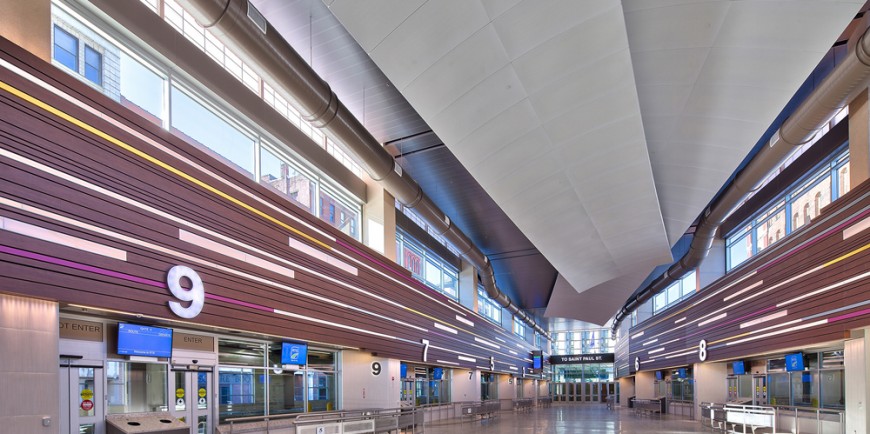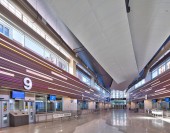Project info:
Efficiency Measure:
Type:
Client:
Engineering Design:
Building:
Key Results:
DESCRIPTION
Facilities where contaminants are generated within various spaces, such as the Rochester Genesee Regional Transportation Authority, are typically designed with high levels of ventilation to diffuse contaminants as they are generated. While the ventilation is an important part of the design, it can represent a significant energy cost especially when considering that the contaminants are not always present. There are frequently times during the day when the air within the Busway ports and the concourse is clean with regards to diesel fumes and particles, other air borne chemicals and carbon monoxide. Providing a high level of ventilation at these times does nothing to improve the quality of air in the passenger loading areas or within the facility, yet consumes significant amounts of energy.
The solution lies in a facility management technique called Demand Controlled Ventilation (DCV). This involves sensing the air within the space for contaminants. When they are present, a signal is sent to the building controls which indicate ventilation should be at full design flow. When the air is free of contaminants, ventilation systems run at lower levels resulting in substantial energy savings.
The number of traditional single location sensors to achieve the above mentioned strategy for RGRTA is 141 This relatively large number of sensors not only presents relatively high first costs, complexity in integration, but also daunting on-going maintenance costs for calibration and replacement (as sensors typically have a 4 year life). .
Bergmann Engineers thus considered a technology developed by Aircuity, Inc. – a Centralized Demand Control Ventilation System (CDCV). The CDCV is a specially designed air sampling system which transports samples of air from the Busway and various locations in the concourse to sets of laboratory grade instruments. This design brings several benefits over the traditional approach of using discrete sensors throughout the facility:
- A much smaller number of sensors is required (first costs are lower).
- Maintenance is far simpler, as the sensors are located in a conveniently accessible location.
- The manufacturer of the system provides a program where the sensors are fully calibrated and refurbished semi-annually. This program includes replacement of any sensor that has reached the end of its useful life for whatever reason at no additional charge.
- Every sample taken by the system is archived and accessible to the owner / facilities management through a secure web portal.
Savings Comparison: Aircuity vs. Traditional Sensors
First Cost
- The estimated installed cost of traditional sensors (141 required) is $183,730.
- The estimated installed cost of the Aircuity platform (141 required) is $151,333.
Life Cycle Cost (note: costs below for Aircuity are reduced as RGRTA facilities has Aircuity Factory Trained Staff for sensor maintenance).
In addition to the first cost savings with Aircuity, the life cycle cost for calibration, maintenance, and replacement is strongly in favor of Aircuity:
- The cost to calibrate the traditional sensors is $41,243 / yr vs. $13,836 / yr for Aircuity.
- The cost to replace sensors after four years is $84,159 (sensor replacement is included with annual service).
- Five year cost for traditional sensor maintenance is $288,392 vs. $59,621 for Aircuity.
- Ten year cost for traditional sensor maintenance is $620,373 vs. $144,778.


